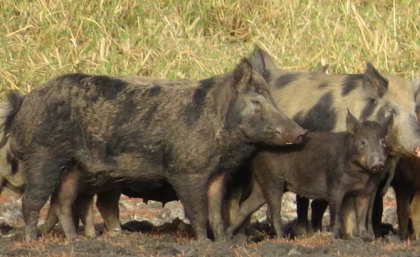Wilds pigs are responsible for the release of about 4.9 million metric tons of carbon dioxide worldwide every year. This is because they uproot carbon sequestered in the soil. The amount released is almost equal to emissions from 1.1 million cars.
 Wild pigs are one of the most widespread invasive species on Earth. Image Credit: Fitzroy Basin Association.
Wild pigs are one of the most widespread invasive species on Earth. Image Credit: Fitzroy Basin Association.
An international team of researchers from The University of Queensland and The University of Canterbury has employed predictive population models along with advanced mapping methods to specifically identify the climate damage caused by wild pigs across five continents.
According to Dr. Christopher O’Bryan from The University of Queensland, the continuous increase in the worldwide population of feral pigs is posing a notable threat to the climate.
Wild pigs are just like tractors ploughing through fields, turning over soil to find food. When soils are disturbed from humans ploughing a field or, in this case, from wild animals uprooting, carbon is released into the atmosphere.
Dr. Christopher O’Bryan, The University of Queensland
“Since soil contains nearly three times as much carbon than in the atmosphere, even a small fraction of carbon emitted from soil has the potential to accelerate climate change. Our models show a wide range of outcomes, but they indicate that wild pigs are most likely currently uprooting an area of around 36,000 to 124,000 square kilometres, in environments where they’re not native,” added Dr. O’Bryan.
Dr. O’Bryan also noted that “This is an enormous amount of land, and this not only affects soil health and carbon emissions, but it also threatens biodiversity and food security that are crucial for sustainable development.”
All currently available models on wild pig count and location were used by the researchers to simulate 10,000 maps of potential global wild pig density.
Then, the researchers modeled the amount of soil area disturbed from a long-term investigation of wild pig damage over a range of vegetation types, climatic conditions, and elevations ranging from lowland grasslands to sub-alpine woodlands.
They subsequently simulated the global carbon emissions caused by wild pig soil damage, data obtained from previous research conducted in the Europe, Americas and China.
Nicholas Patton a PhD candidate from the University of Canterbury commented that the study would have ramifications for mitigating the impacts of climate change into the future.
Invasive species are a human caused problem, so we need to acknowledge and take responsibility for their environmental and ecological implications. If invasive pigs are allowed to expand into areas with abundant soil carbon, there may be an even greater risk of greenhouse gas emissions in the future.
Nicholas Patton, PhD Candidate, University of Canterbury
“Because wild pigs are prolific and cause widespread damage, they’re both costly and challenging to manage. Wild pig control will definitely require cooperation and collaboration across multiple jurisdictions, and our work is but one piece of the puzzle, helping managers better understand their impacts,” added Mr. Patton, who said the study would have implications for inhibiting the effects of climate change in the future.
“It’s clear that more work still needs to be done, but in the interim, we should continue to protect and monitor ecosystems and their soil which are susceptible to invasive species via loss of carbon,” concluded Patton.
Journal Reference:
O’Bryan, C. J., et al. (2021) Unrecognized threat to global soil carbon by a widespread invasive species. Global Change Biology. doi.org/10.1111/gcb.15769.